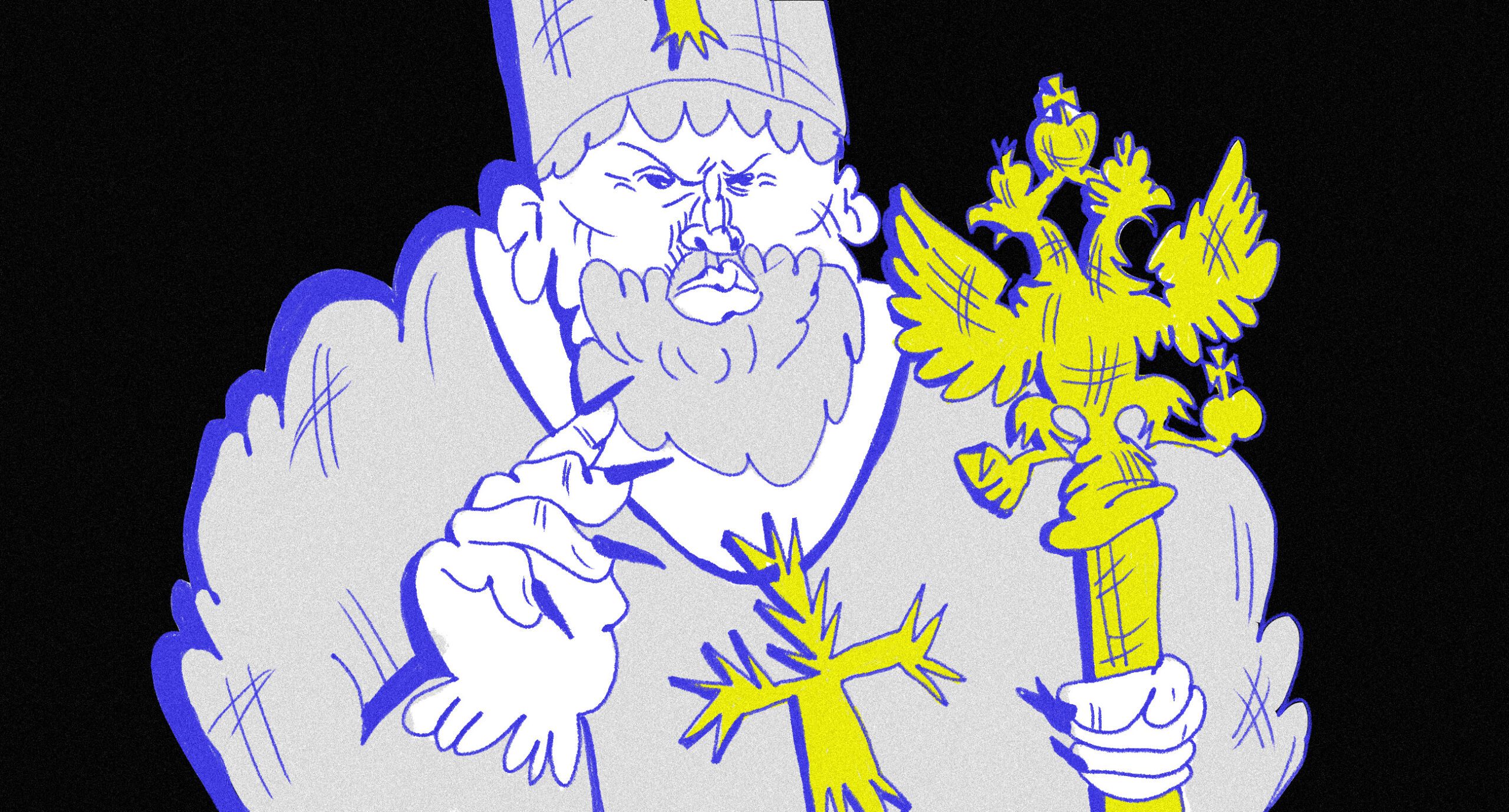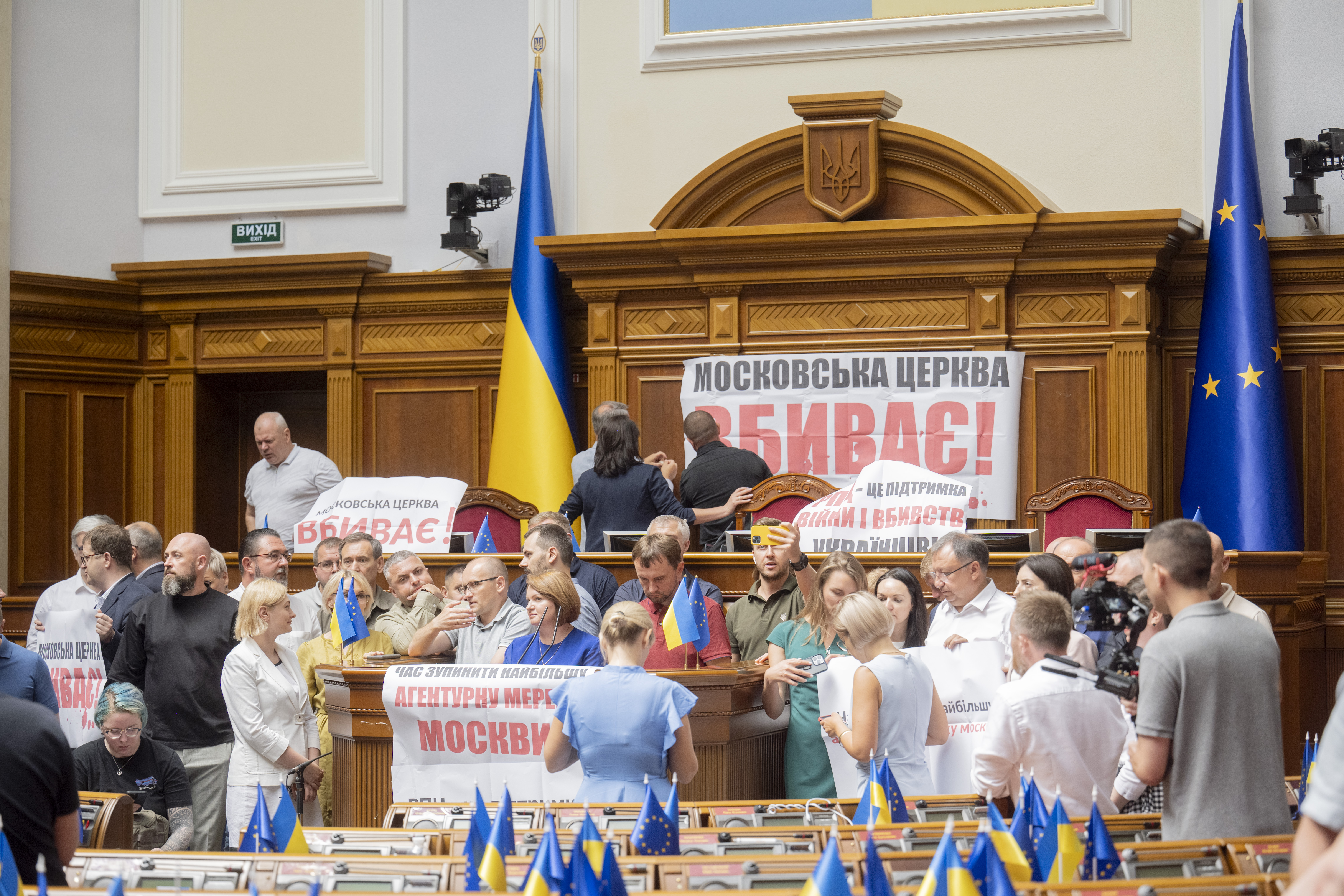There Is Power, There Is Will, but There Is No Willpower. Why Are Moscow Churches Still Not Banned in Ukraine?

In 2023, the Verkhovna Rada took the first step toward banning the activities of the Russian Orthodox Church and related religious organizations in Ukraine by voting in the first reading on a bill popularly called “the ban on the UOC-MP”. However, despite the obvious evidence of the Moscow Patriarchate’s cooperation with the Russian security services and nationwide support for the ban, the final decision has been postponed yet again.
Why this is happening and whether we can expect the law to be adopted soon, Zaborona’s editor Svitlana Hudkova spoke with Mykola Kniazhytskyi, MP from the EU faction and member of the relevant parliamentary committee on humanitarian and information policy.
The law banning the UOC-MP was not put to a vote. Why?
On July 23, 2024, some MPs of the Verkhovna Rada once again blocked the rostrum, demanding consideration of Bill 8371 on the ban on religious organizations associated with Russia. With that, the session was closed and adjourned until August 21. As later explained by First Deputy Speaker Oleksandr Korniyenko (Servant of the People party), parliamentarians needed to reach a consensus and collect a sufficient number of votes. However, Mykyta Poturayiev (Servant of the People party), chairman of the parliamentary committee on humanitarian and information policy, insisted that there were enough votes to pass the bill.

This is confirmed by Mykola Kniazhytskyi. According to him, the Servants of the People, who have a majority in the committee, unanimously supported the bill. Therefore, representatives of the presidential faction were ready to vote.
“But at the conciliation board, decisions are made by the heads of the factions, depending on the majority. Since we have a mono-majority in the form of the Servant of the People faction, it depends on the decision of David Arakhamia [the head of the faction] whether to put the draft law to a vote. He was against it. So were the leaders of the two groups created on the wreckage of the former [pro-Russian] Opposition Platform For Life,” the MP noted.

Illustration: Kateryna Kruhlyk / Zaborona
How and why the law was demonized
The draft law banning religious organizations associated with the Russian Federation is politically sensitive and causes considerable controversy. Ukraine has a principle of freedom of religion, so any restrictions on religious activity can be perceived as an attempt on democratic values. In addition, such a decision could lead to a split in society and provoke a negative reaction both inside and outside the country.
However, Mykola Kniazhytskyi assures that the document complies with Article 9 (freedom of thought, conscience, and religion) and Article 11 (freedom of assembly and association) of the Convention for the Protection of Human Rights, the case law of the European Court of Human Rights and the Constitution of Ukraine.
“This document is being demonized. In fact, it is super soft. It only prohibits the activities of the Russian Orthodox Church (ROC) in Ukraine and requires others to cut ties with them. If this is done, the religious organization can continue to operate. And the procedure to determine whether there are ties to the ROC is quite long: first, an examination, then an order to eliminate the problems. If that is not done, there’s the court, and then its decision can still be appealed. Several years can easily pass from the establishment of an organization’s ties with the ROC to its actual ban,” the parliamentarian explains.
But despite certain shortcomings of the bill, Kniazhytskyi believes it is worth passing because the state will get legal mechanisms to combat pro-Russian religious organizations.
“It gives the State Service for Ethnic Policy and Freedom of Conscience as well as the Judiciary grounds to ban the activities of structures associated with the Russian Church in Ukraine. It allows the State Security Service to conduct operational activities better. It also simplifies the transition of religious communities to the Orthodox Church of Ukraine. All of this is in the bill, so it is really good. Although, in my opinion, it should be stricter,” the MP said.

Illustration: Kateryna Kruhlyk / Zaborona
The influence of the Russian Orthodox Church on the Ukrainian government
For decades, the Russian Orthodox Church has been not just a religious institution in Ukraine, but a powerful instrument of political influence. For decades, the Russian church has been promoting the ideas of the “Russian world” and supporting political regimes that served the Kremlin’s interests. Among the representatives of the Ukrainian government, Knyazhytsky says, there are still many people for whom the interests of the Russian church are more important than the national security of their country. And this is in fact the real reason behind the delay in the adoption of the bill.
“Of course, the Russian Orthodox Church is extremely influential and has ties to Ukrainian oligarchs. Ukrainian rich people have often increased their wealth through cooperation with Russia. And there are those who continue to do so. They used the same money to finance the UOC-MP, which remained in unity with Moscow, and for this, they received some support in the elections,” emphasizes the European Solidarity MP. “I think that this cooperation with Moscow slows down the processes at various stages. Even though we have been in a full-scale war with Russia for three years now.”
There are supporters of the Russian church among both MPs and government officials, he notes. Moreover, it is strange that the President’s Office has not come up with a clear position on this bill, although the government introduced it on behalf of President Volodymyr Zelensky.
“The MPs finalized the submitted document to make it more effective. Although, in my opinion, this is not enough, this is the result of a compromise. Yes, I don’t think the president is against it, but I don’t see support from the Office and the leadership of his party,” the opposition MP emphasizes.

MPs block the rostrum during a session of the Verkhovna Rada. A bill banning religious organizations affiliated with Russia was being considered. July 23, 2024, Kyiv, Ukraine. Photo: European Solidarity/Telegram
Religious split and loss of international support
Against the backdrop of the consideration of the draft law on combating Russian churches, Moscow has launched a large-scale information campaign aimed at inciting religious conflicts. In particular, the Kremlin is trying to weaken Kyiv’s position in the international arena by using the religious factor. These Russian narratives are used by supporters of the UOC-MP as an excuse to postpone the vote of the bill.
However, according to Kniazhytskyi, they have nothing to do with reality. First, most Ukrainians support the ban on the UOC-MP. Secondly, there are tens of thousands of churches in Ukraine, and only 5% of believers attend churches of the Moscow Patriarchate. Thirdly, no one’s proposing any kind of ban on religious activities at all, the ban in question only concerns ties with Moscow.
“The biggest sanction that can be imposed is that an organization in question will lose the privilege of using the communal buildings and land. In fact, the bill should reduce the tension in our society,” the MP assures. “Because when believers see one of the priests glorifying Russian Patriarch Kirill or refusing to perform funeral services for Ukrainian heroes, they go smash up the church where it happened and banish those Moscow priests, which leads to conflict. This law is designed precisely to make sure that these conflicts do not happen. And this does not suit Moscow, which wants to destabilize our society.”
The politician is sure that the best counter-propaganda to the so-called concerns of our Western partners, particularly in the United States, about the alleged persecution of Christians in Ukraine would be the rapid adoption of this law.
“Then everyone would see that Christians have been praying and are still praying. And no one harasses or persecutes them. Because the law does not provide for the simultaneous prohibition of all churches or even a single one,” emphasizes Mykola Kniazhytskyi, “And so, to prevent it from being adopted, the Russians are creating such a negative background in the United States and other countries, which, I emphasize, will not have any consequences for our support. And this becomes an excuse for the government officials, who are counting on the continued support of the Russian church in their elections. These are elements of a big game that harm our national security.”
Voting to ban the UOC-MP in August 2024
As already noted, the parliament was adjourned until approximately mid-August.
During this time, MPs have to work out the final version of the bill, which will receive the support of the majority. And immediately after the break, the document should be put to a vote. But Kniazhytskyi has some doubts about this.
“I would really like this to happen, but I doubt that the government will put it to a vote. If they do, there are votes to adopt it,” the MP said.







